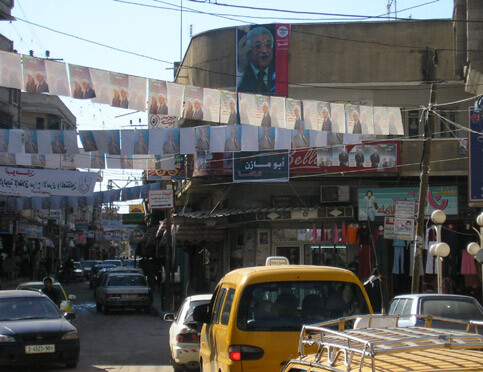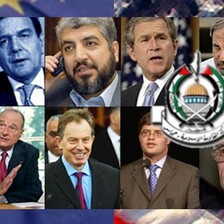Al Jazeera 17 April 2005

Posters of Mahmoud Abbas (‘Abu Mazen’), Mustafa Barghouti, Taysir Khaled, and other president candidates filled the streets of Khan Yunis in Gaza in January 2005. (Arjan El Fassed)
The Palestinian Authority is likely to postpone elections, due on 17 July, in a move that Hamas says would be political meddling by its rival, the ruling Fatah party. Fatah Minister of Parliament Hatim Abd al-Qadir said the postponement was expected to be announced in a few days and that it had more to do with procedural matters than other considerations.
“The executive branch of the Palestinian Authority is responsible for the postponement. Brother [President] Mahmud Abbas wants to postpone the elections on the one hand, and, on the other, is trying to blame the lawmakers for this decision.”
Abd al-Qadir said the delay was a reality, adding that setting a new date would not be possible before a new election law was passed. Fatah is the ruling party in the Palestinian Authority (PA) and is in control of the government, the legislative council and the security agencies.
Hamas, an acronym for the Islamic Resistance Movement, reacted strongly on Saturday to the possibility of a delay. Hamas leader Mahmud al-Zahar told Aljazeera.net that some Fatah members “are afraid they will lose their grip on power, and they are interested in weakening Mahmud Abbas”.
Parliament is expected to vote on Sunday on a modified election law.
Voting blocs
The Fatah parliamentary bloc, which controls 65 seats of the 87 making up the Palestinian Legislative Council, has proposed a mixed system whereby a third of MPs are elected at large, while the remaining two-thirds are elected within their local electoral districts. Abbas favours at-large elections for the entire West Bank, Gaza Strip and East Jerusalem.
This proposal, critics say, will benefit large parties such as Hamas and Fatah and work against smaller groups. Hamas, which is contesting legislative elections for the first time and is expected to make a strong showing, does not object to either of the proposals, arguing that it is important to hold a credible legislative election for Palestinian representatives.
Internal opposition
Some within Fatah are opposed to the delay on the grounds it will erode the credibility of the PA and Abbas. “Any postponement would harm us tremendously,” Hasan Khraisha, a Fatah MP and former head of the monitoring committee of the legislative council, told Aljazeera.net.
“It would show the world that our commitment to true democracy is less than genuine.” Khraisha said there was already a chasm between the legislative council and the masses. “This gap would grow even larger in case of postponement. We have to remember that this council’s term ended several years ago.”
Hamas reaction
Hamas accused elements within the movement of meddling with the national interests of the Palestinian people. “It seems there are certain people within Fatah who give their own selfish interests precedence over the interests of the Palestinian people,” said Al-Zahar.
Al-Zahar said he was assured by Abbas the elections would be held on time. However, he said he did not trust that Abbas would be able to overcome the strong opposition within Fatah to holding the elections in July.
Street protests
He warned that Hamas might take to the streets to protest against the postponement. “The masses need to send a clear message to those irresponsible and self-serving Fatah leaders that the vital interests of the Palestinian people cannot be entrusted to the whims and personal calculations of a few people,” he said.
The veteran Islamist leader warned that the continuing crisis and power struggle within Fatah might cause further delays. “This is what I am worried about and this is what we should strive to prevent from happening.” His pessimism is shared by Palestinian columnist Hani al-Masri.
Wrecking tactics
He warned that the Fatah National Congress, which is due to convene in August, might witness serious differences. “If so, no elections would be possible, because the would-be losers would not accept the democratic game and might try to wreck the boat using whatever means available, including violence.”
Al-Masri said Fatah hoped that by postponing the elections for three months the leadership would utilise the expected Israeli withdrawal from Gaza and a small area in the northern West Bank to enhance its image, tarnished by accusations of corruption.
However, al-Masri, who himself is close to Fatah, said it was unclear whether Fatah would be able to increase its popularity. “Fatah would have to reform and renew itself. This would create a temporary but acute power struggle and might tactically harm Fatah in the short run. But in the long run, this would help the movement and enable it to regain strength.”
Later on Saturday, Abbas was due to head to the Egyptian resort of Sharm al-Shaikh to meet Egyptian President Husni Mubarak to discuss progress on the political track with Israel.
Khalid Amayreh is a journalist based in the occupied West Bank. This article was originally published by aljazeera.net and reprinted on EI with permission.
Related Links





